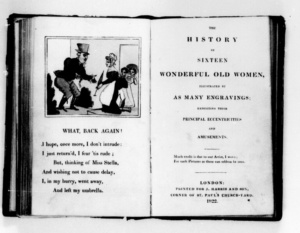Limericks for St. Patrick’s Day
Listen to the Recess! Clip
| Author | Kevin Shortsleeve |
| Air Date | 3/17/2005 |

Limericks for St. Patrick’s Day Transcript
“There was an old man who lived in Nantucket.”
Now hold on, don’t worry. This isn’t what you think. I want to clear the name of that poor Old Man once and for all. The original Limerick, which dates back to the 1800s runs like this:
There was an old man of Nantucket
Who kept all his cash in a bucket
But his daughter, named Nan
Ran away with a man
And as for the bucket, Nan-tucket
It is with ancient Greek marching songs that we first find the metrical form of the Limerick. These songs were probably much like our modern equivalent:
“We’re in the army now.
We’re not behind a plow.
We’ll never get rich, – By digging a ditch.
We’re in the army now.”
Though poems with forms similar to limericks have been found dating back to the 12th century in England, the modern literary limerick appears to be an eighteenth century Irish innovation. One legend tells of a song brought back to Ireland from France by returning members of the Irish Brigade. The chorus of this song was “Will you come up to Limerick?” Impromptu verses were added to this chorus telling the adventures of persons from various Irish cities.
In London, in 1820, the first book of limericks was published. It was entitled The History of Sixteen Wonderful Old Women and it held selections such as this:
There was an old woman named Towl
Who went to sea with her owl,
But the owl was sea-sick And screamed for a psychic;
Which sadly annoy’d Ms Towl.
Limericks, however, owe their great fame more to Edward Lear than anyone else. His Book of Nonsense, published in 1846 held selections such as:
There was an old man on whose nose
Most birds of the air could repose
But they all flew away
At the closing of day
Which relieved that old man and his nose.
Limericks enjoyed their greatest fame during the late 1800’s and early 1900’s. At parties, guests were expected to improvise limericks and shout them out as they stood in a circle. When one person had finished, the crowd would call out the line from the Irish soldier song “Will You Come Up From Limerick?” and move on to the next person. It is from this heyday of ‘limerickmania’ that we owe the invention of the rhyming dictionary.
With everyone eventually joining in the act, including the likes of Rudyard Kipling and Woodrow Wilson, limericks eventually got funnier and funnier.
There once was a plesiosaurus
Who lived when the world was all porous;
But it fainted with shame,
When it first heard its name,
And departed long ages before us.
And now, in honor of St. Patrick’s Day, here’s a grand finale that’s sure to tickle funny bones green with blarney:
A tutor who taught on the flute
Tried to teach two tooters to toot.
Said the two to the tutor,
“Is it harder to toot, or
To tutor two tooters to toot?”